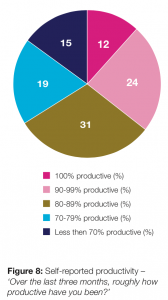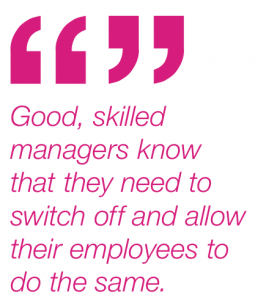Want your staff to be more productive? Make them smile
Thursday 14 January 2016
With UK productivity lagging behind its European rivals, Chancellor George Osborne has made solving the puzzle a key part of his economic plans.
New research from CMI may provide part of the answer.
The 2016 Quality of Working Life report finds that productivity is closely linked to wellbeing at work: the higher your managers’ stress levels, the more unproductive they become.
And Britain’s managers are under the cosh. Only 12% of the 1,574 managers surveyed reported being 100% productive (see chart, right); 15% said their personal productivity level was below 70%. 
Managers who reported their productivity as being at 90-99% (35% of managers) suffered no stress at all during the previous three months.
Managers who experience stress most often say their productivity dips below 70%.
THE ANSWER IS IN YOUR LUNCH BREAK
Recruitment firm Loopdynamic has introduced a novel initiative to reduce stress, improve staff health and boost productivity.
Employees are encouraged to include gym time in their working day, and everyone is offered a corporate membership at a local gym. If they go at lunchtime, they get a 90-minute lunch break – instead of the customary hour.
Often, says HR and operations manager Katy Garnell, a whole group of colleagues will go together, which usually results in a highly productive afternoon of work.
“When they get back, you can really tell the difference,” she says. “When they’re making their calls they’re energised, which increases their productivity. It shows in their stats and KPIs we track.
“You can clearly see the productivity levels go up after lunch.”
THE BENEFITS OF GOOD MANAGEMENT
Quality of Working Life found that managers report being twice as productive within the best management regime.
Where managers are innovative, 43% of managers rate their personal productivity as 90% or better; if managers are secretive or suspicious, only 20% score highly for personal productivity.
CMI chief executive Ann Francke said: “The impact on managers’ work is great: the longer the hours they put in, the less productive they say they become. This should be a big, flashing warning light for employers. 
“Good, skilled managers know that they need to switch off and allow their employees to do the same. The report highlights the difference that good management makes to wellbeing, to engagement and ultimately to performance. The conclusion is inescapable: helping managers to strike the necessary work/life balance must be a priority for every organisation facing up to the challenge of improving productivity.”
SIX WAYS TO EMPOWER STAFF AND PROMOTE PRODUCTIVITY
True job satisfaction flows from the sense of satisfaction the job offers; the quality of team and line manager relationships, and the opportunities for development. Managers can influence all of this.
Here, from CMI, are six ways to empower your staff and boost productivity:
Give autonomy – make managers masters of their own destiny. Employees should have the freedom, trust and autonomy to make their own decisions about how they work.
Show trust in their judgment. Hold people accountable for the outcomes of their work, but do not be prescriptive about how they work.
Job design – ensure jobs and the processes behind them are structured to enable role autonomy and also to give people opportunities to be part of a team, another key driver of satisfaction.
Tailor reward and recognition strategies – recognise values-based behaviour and reward it accordingly. Recognise what people have done to achieve results.
If managers are already working the equivalent of a typical annual leave entitlement in excess hours, is an extra day of holiday truly going to be perceived as an incentive?
Recognise employees’ value – a sense of achievement is fundamental to job satisfaction and engagement, so design recognition strategies to enhance employees’ sense of value.
Support personal and professional development – provide employees with clarity about how they can progress their careers and support their development, aligning with business needs.
Encourage innovation – managers have a responsibility to create environments in which innovation is encouraged not stifled. Invite employees to freely share ideas for using their time more productively and test possibilities quickly.
Find out more about the Quality of Working Life study and download the full report at www.managers.org.uk/qualityofworkinglife
“It’s about fostering an environment that supports women”
Chartered Manager of the Week Emma Finney CMgr FCMI has climbed the career ladder while volunteering and raising a family
“I already had the passion… now I feel qualified”: Hollie’s management apprenticeship story
How a Level 5 management apprenticeship boosted actuary Hollie Haslam CMgr MCMI’s confidence
“It was a leap of faith… I’ve never looked back”: From completing to teaching a Chartered Manager Degree Apprenticeship
Dawn Fletcher-Wilde CMgr MCMI had over 16 years of NHS experience before she enrolled on a degree apprenticeship
“Chartered Manager status was my Everest”
How Chartered status gave Steven Platts CMgr FCMI the confidence to take on a C-suite position
Article
Our extensive range of articles are designed to keep you in the loop with all the latest management and leadership best practice, research and news.
Members See More
CMI Members have access to thousands of online learning and CPD resources. Learn more about our membership benefits
Join The Community
CMI offers a variety of flexible membership solutions, tailored to your needs. Find out more and get involved in the CMI community today.
